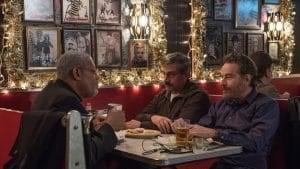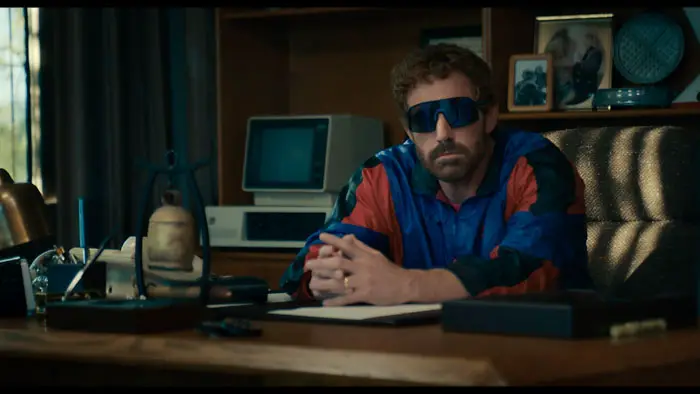
If you were to read the plotlines for most of director Richard Linklater’s movies like Boyhood and Everybody Wants Some!! before seeing them, you’d be justified in anticipating a long, dull slog. Thankfully, the Texas-based filmmaker doesn’t need to jolt viewers with story twists or action scenes to fill his running times.
Last Flag Flying is the tale of three Vietnam War veterans who reunite when one of the men has the unenviable task of burying his son who recently died during the war in Iraq. Linklater and co-screenwriter Darryl Ponicsan (who wrote the novel The Last Detail and who’s adapting another one of his books here) ask uncomfortable but expected questions here. It’s easy to wonder why we continue to send younger Americans off to fight even when we remember how badly previous wars have gone.
That said, much of Last Flag Flying is surprisingly warm and often funny. The simple plot is a launching point for some terrific performances and a thoughtful examination of how people change once a conflict ends.

“It’s easy to wonder why we continue to send younger Americans off to fight even when we remember how badly previous wars have gone.”
Also by setting the story in 2003, Linklater, as he did in Boyhood, frequently points out how much the world has changed in what seems like the blink of an eye. The current omnipresence of cell phones wasn’t a fact of life then, and there was a sense that fighting in Afghanistan and Iraq would end soon. Even though the events in Last Flag Flying take place more recently than in Everybody Wants Some!!, they might as well describe a world in the Stone Age.
It’s hard to imagine how Norfolk bar owner Sal Nealon (Bryan Cranston) stays in business because he consumes an alarming amount of the spirits served there. There also don’t seem to be enough customers to keep the place in the black. Sal must have built up a formidable tolerance for booze because he can still throw out witty barbs while his only patron slurs himself to sleep.
Suddenly, the customer base doubles when a quiet, mustached fellow about Sal’s age wanders in and pays for his beer with cash from an envelope. Larry “Doc” Shepard (Steve Carell) reveals that he and Sal served together in Nam and that he needs help to bury his son who died during the recent invasion of Iraq.
If Doc has become quiet and introspective and Sal has learned how to self-medicate since their war ended, their friend Richard Mueller (Laurence Fishburne) is now a pastor and has left his chemical dependencies and other vices by following his new calling.

“By holding off on obvious pyrotechnics, Linklater achieves more emotional impact than he would have if his characters had spent the entire film yelling at each other.”
When the three arrive to see the younger man’s remains, they discover that he didn’t die in the spectacular (and medal-worthy) firefight they’ve been led to believe. A witness (J. Quinton Johnson) to his death says that Shepard was simply shot by an insurgent while he was simply doing a favor for his buddies. While the lad’s death is still tragic and honorable, Doc questions having his son buried at Arlington because he’d like to think of his offspring as something other than a Marine.
The three then begin a long quest to get the younger man back in his hometown in New Hampshire. Sal, Doc and Mueller have a lot of issues they left unresolved back in Vietnam, so their trip and their task isn’t going to be simple. Sal continually needles Mueller about his past because he almost seems to miss his former friend’s vices. The fact that those habits almost killed both of them doesn’t seem to enter into Sal’s thinking.
Cranston is an old hand at playing complicated, dynamic characters, so Sal remains intriguing even when his verbal barbs are more mean than amusing. Casting Fishburne as a pastor seems an obvious choice because his basso profundo voice sounds ideal for the pulpit. He also projects enough heart and intelligence to make Mueller’s platitudes seem like more than hollow bromides.

“Thankfully, the Texas-based filmmaker doesn’t need to jolt viewers with story twists or action scenes to fill his running times.”
Carell doesn’t advertise Doc’s grief, but you can spot it when Linklater puts him in the corner of the screen. While other characters are having idle chatter, Carell is wrestling with emotions no parent wants to face. Thankfully, Linklater and Ponicsan resist the temptation of handing him Oscar-clip monologues.
They also load the film with lots of snappy banter while never losing sight of the fact that their story still involves the death of a man whose life had barely begun.
By holding off on obvious pyrotechnics, Linklater achieves more emotional impact than he would have if his characters had spent the entire film yelling at each other. His quiet, slow films have a more lasting impact than many with swift dramatic story arcs.

Last Flag Flying (2017) Directed by Richard Linklater. Written by Darryl Ponicsan and Richard Linklater, based on Poniscan’s novel. Starring: Bryan Cranston, Steve Carell, Laurence Fishburne, J. Quinton Johnson, Deanna Reed-Foster, Yul Vazquez, Cicely Tyson.
8 out of 10

